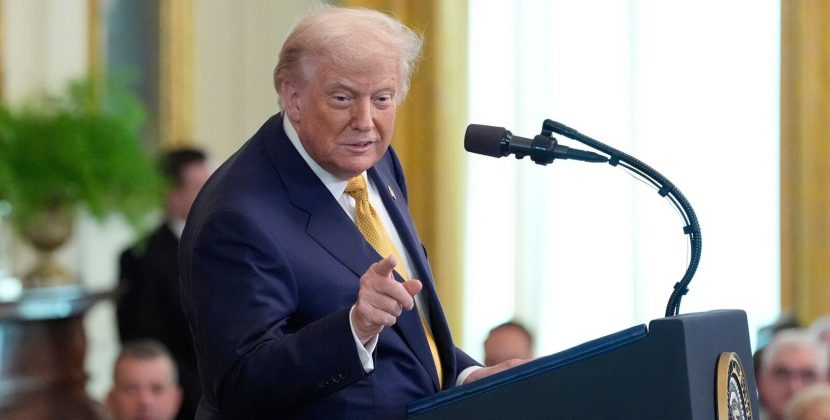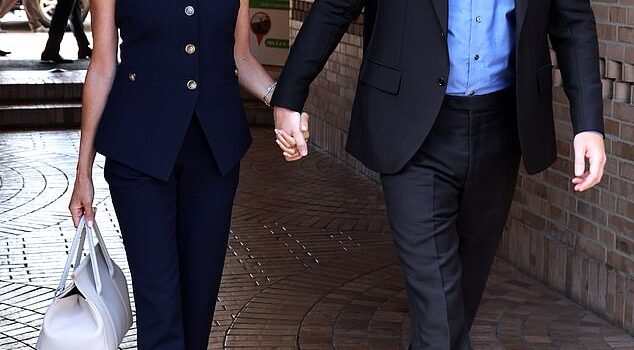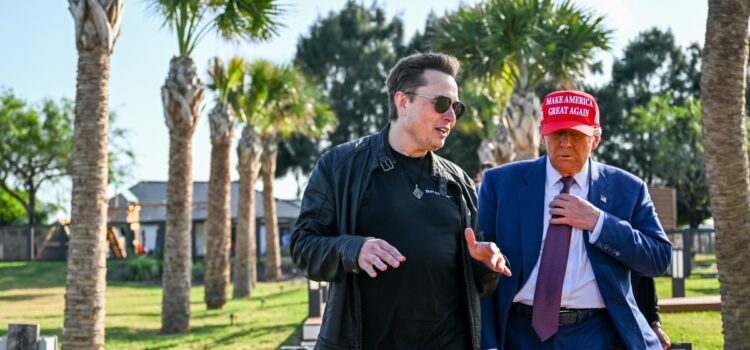
Vanity Fair’s damning dissection of the Sussexes’ five years in America could have its roots in a row that allegedly began with Meghan’s 2017 cover story in which she officially announced to the world she was ‘in love’ with Harry.
In a savage takedown published last week, headlined ‘American Hustle, contributing editor Anna Peele spoke to ‘dozens’ of sources connected to the duo who labelled the Sussexes as the ‘most entitled, disingenuous people on the planet’.
But why did the formerly pro-Sussex publication turn against Meghan and Harry? It seems the relationship soured when the Duke and Duchess of Sussex allegedly accused Vanity Fair of publishing a ‘racist headline’ on Meghan’s cover story in October 2017.
It was unlikely Meghan would have made the front cover of the celebrity bible off the back of her role in Suits, but when the magazine landed a major coup by securing the first interview with Prince Harry‘s then girlfriend, it was naturally a sensation.
However, according to Valentine Low’s book, Courtiers: The Hidden Power Behind the Crown, Meghan was unhappy that, despite being a positive piece, the focus of the story was her relationship with Harry.
She also allegedly complained that the cover line was racist, and the couple reportedly tried to have the headline on the digital edition changed.
Perhaps this cooling of relations between Meghan and the publication laid the seeds for the latest bombshell article, which claimed that some people who worked with Meghan ended up needing therapy and that she allegedly didn’t come up with the idea for her Spotify podcast, Archetypes.
The piece also stated that the Duchess of Sussex could be ‘really, really awful’ when things did not go her way.

Over the past couple of days, many allegations about Harry and Meghan have come to light after Vanity Fair published a damning profile on the couple (pictured in August 2024)
According to The Times, the couple have dismissed the allegations with sources close to the Sussexes describing them as ‘distressing’.
Meghan’s first foray with Vanity Fair began in the summer of 2017 when Meghan wanted a new PR team to help her in the U.S.
She hired PR adviser Keleigh Thomas Morgan from New-York based agency Sunshine Sachs, whose clients have included Hollywood stars Salma Hayek, Jane Fonda and Natalie Portman.
The New York-based agency had been advising Meghan since her days as an actress on legal drama Suits, before she ditched them in 2022.
Meghan agreed to do an issue with Vanity Fair in autumn, which Kensington Palace signed off on but said that Keleigh could sort out the negotiations.
A close-up glamorous feature of the Suits actress appeared on the cover of the magazine, featuring her luscious locks and clear, freckled skin, accompanied by the headline that proclaimed ‘She’s Just Wild About Harry’.
The story quoted Meghan speaking openly about her romance with the Prince, saying: ‘We’re in love. This [time] is for us.
‘It’s part of what makes it so special, that it’s just ours. But we’re happy. Personally, I love a great love story.’

It seems the relationship soured between the pair when the Duke and Duchess of Sussex allegedly accused Vanity Fair of publishing a ‘racist headline’ on her cover story in October 2017

The pair accused the magazine cover of racism because of a 1939 blackface song by Micky Rooney and Judy Garland called ‘I’m Just Wild About Harry’

Meghan hired PR adviser Keleigh Thomas Morgan and the pair allegedly had a rocky relationship in 2017
But Duchess of Sussex was reportedly ‘unhappy’ with Keleigh and disliked the cover story, according to royal author Valentine Low.
A source was quoted as saying: ‘She was very unhappy with how that had been handled. And she was looking to throw blame in every possible direction, despite it having been a positive piece.
‘She did not like the photographs. She thought the story was negative. She was upset that it was about Harry, not about her.’
Harry and Meghan also allegedly thought the headline was racially motivated and pointed out the song, ‘I’m Just Wild About Harry’, had been performed by Judy Garland and Mickey Rooney as a blackface number in the 1939 film Babes In Arms.
‘They [Harry and Meghan] tried to get it changed online, because [they thought] it had been racially motivated,’ said the source. ‘[Meghan] was so angry with Keleigh, she wanted to fire her.’
And although things soon cooled off between Meghan and Keleigh, there was a time when her PR adviser was cold with the former Deal or No Deal briefcase model.
Meghan was also described as acting ‘like a Mean Girls teenager’ in the article, which was released on Friday.
She would reportedly be ‘warm and effusive’ towards employees at the start before turning ‘cold and withholding toward the person she perceived to be responsible’ when something ‘went poorly, often due to Meghan and Harry’s own demands’.
A source who worked in media projects told the publication: ‘She’s constantly playing checkers- I’m not even going to say chess – but she’s just very aware of where everybody is on her board.
‘And when you are not in, you are to be thrown to the wolves at any given moment,’ which they say meant ‘undermining’ behaviour, adding: ‘It’s talking behind your back. It’s gnawing at your sense of self. Really, like, Mean Girls teenager.
However, producer Jane Marie, who worked with the couple during the development of Archewell audio projects, insisted to Vanity Fair that Meghan is ‘just a lovely, genuine person’.
Elsewhere, the profile details allegations from former employees of Meghan who reportedly felt mistreated during their time working with her.
These claims, which echo accusations from her time at Kensington Palace, paint a troubling picture of a woman whose behaviour allegedly left staff ‘having therapy’ and led to allegations of ‘bullying’ behind the scenes. These allegations were vehemently denied by representatives of Meghan and Harry at the time.

Meghan was also described as acting ‘like a Mean Girls teenager’ in the article, which was released on Friday
Despite the allegations made in the profile, staff loyal to Meghan and Harry have previously defended the couple to US Weekly magazine, describing the Sussexes as ‘caring’ bosses who give employees their children’s old baby clothes, fresh flowers and ‘care packages’.
Josh Kettler, Harry’s chief of staff who left after just three months in August last year, insisted he was ‘warmly welcomed’ by the pair and describes them as ‘dedicated and hardworking’.
Ben Browning, Archewell’s former head of content – who was responsible for their tell-all Netflix documentary but then left before the end of his contract- says his experience at the company and with Meghan and Harry in general ‘was positive and supportive’
Their PR chief, ‘global press secretary’ Ashley Hansen, who is leaving the company to start her own firm, says they treated her with ‘the kind of concern and care a parent would express if it were their own child’ when she took time off for surgery, adding that they also sent flowers and gifts.
These positive comments came off the back of a negative piece published in the Hollywood Reporter, in which Meghan was described as a ‘dictator in high heels’.
Tom Bower, the royal author and investigative journalist, described the recent revelations as ‘devastating’ for Meghan, especially given her recent attempts to reshape her public persona as a warm, loving mother and wife.
‘Having strongly denied the accusations that she bullied her staff in Kensington Palace, the revival of her image of the Difficult Duchess is a disaster just on the eve of the launch of Netflix‘s ‘With Love, Meghan’.

Meghan Markle and Prince Harry are pictured at the Invictus Games in the Netherlands in 2022
‘Having invested so much to re-brand herself as a loving, caring Californian mother and wife, the VF disclosures have poisoned the smiling image of the welcoming home-maker.
Prince Harry, too, faces growing scrutiny, with experts noting his portrayal in the Vanity Fair piece as ‘lost, out of his depth, and naive.’
Richard Fitzwilliams, a royal commentator, warned that the couple’s reputation in the US could be severely damaged.
‘Harry is portrayed as lost, out of his depth and naïve. Neither, according to the article, appear to understand what a successful career in show business actually involves.’
According to Fitzwilliams, the couple’s attempts to project a caring, philanthropic image through efforts like helping victims of California’s wildfires are unlikely to gain traction in light of the ongoing allegations.
‘The Sussexes are attempting to project a caring image by helping some of those affected by the cataclysmic wildfires currently ravaging California. They won’t get far after publicity is given to this.
‘Her With Love, Meghan cookery series is, judging from the trailer, saccharine and silly. This was postponed and is now scheduled for a release on 4th March but unenthusiastic online reaction might make the streaming giant think twice and dump it and, when their contract runs out later in the year, preserve very little of it, if any.
‘The Sussexes have made so many accusations against the royal family. They, especially Meghan, now have a lot to answer. Nobody likes bullies, especially entitled bullies!’
He continued: ‘It speaks volumes that the Sussexes were not available for interview. This is a probing, balanced article that has been researched with interviews from the Sussexes’s admirers and detractors.
‘It also makes the case that they are now way out of their depth in showbiz. Also they are far from being admired by their neighbours in Montecito. They left Britain to escape press scrutiny.
‘Yet in the US, they want favourable press. The article concludes there is precious little to them, with Harry wanting to reconnect with his family. I fear whilst he is with Meghan, this is unlikely to occur.’











Comments